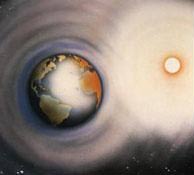VOICE ONE:
This is SCIENCE IN THE NEWS in VOA Special English. I'm Bob Doughty.
VOICE TWO:
And I'm Faith Lapidus. This week, we will tell about a study linking activity on the sun to changes in Earth's climate. We will also tell about a discovery involving patients with attention deficit hyperactivity disorder. And, we will hear some music written especially for monkeys.
(MUSIC)
VOICE ONE:
An American study has shown a link between activity on the surface of the sun and weather conditions on Earth. Scientists say small changes in the sun's brightness can produce effects on Earth similar to two weather events in warm waters of the Pacific Ocean. The two events are commonly known as La Nina and El Nino. Reports say the study may lead to better predictions of temperatures, rainfall and the intensity of weather systems.

Scientists measure solar activity by counting dark areas on the sun's surface. These sun spots produce bursts of energy. Other scientists have shown that sun spot activity can be measured in periods of time that last about 11 years. The total energy reaching Earth from the sun rises and falls by just one tenth of one percent across this solar cycle.
VOICE TWO:
In the new study, scientists examined more than 100 years of ocean temperature records. They also used computer programs designed to reproduce the world's climate. They found the highest levels of solar activity cause small, but far-reaching effects on weather systems around the world. These periods of high activity are known as solar maximum.
Gerald Meehl was the lead writer of a report about the study. He says his team showed the effects of a new process to understand what happens in the Pacific's warm waters where there is a maximum of solar activity. Professor Meehl works for the National Center for Atmospheric Research in Boulder, Colorado. The center organized and helped to pay for the study. The findings were published recently in the Journal of Climate.
VOICE ONE:
The report says that, at maximum activity, the small increase in sunshine over several years causes a small temperature increase in Earth's atmosphere. This is especially true in cloud-free areas of the Pacific.
The extra heat is enough to cause ocean waters to evaporate into the air. This wet air is then carried by trade winds to the normally rainy areas of the western Pacific, near the Equator. This creates more rainfall.
The trade winds become stronger as the process gets repeated. This keeps the eastern Pacific cooler and drier than normal. It also creates conditions similar to the weather event known as La Nina. However, the cooling of about one and one-half to three degrees Celsius is only about half as strong as a real La Nina.
VOICE TWO:
About two years after a solar maximum, the Pacific experiences conditions similar to El Nino – the opposite of La Nina. These are also only half as strong as a real El Nino.
Real La Nina events have been linked with cooler than normal temperatures on the surface waters of the Pacific Ocean. El Nino events are linked to warmer than normal temperatures. Both events can have important effects on weather systems and climates around the world.
Gerald Meehl says a better understanding of solar activity and its influence on weather may help researchers predict long-term weather conditions.
(MUSIC)
VOICE ONE:
Attention deficit hyperactivity disorder is known by the letters A.D.H.D. Children with A.D.H.D. might have trouble paying attention. They might not seem to listen. They might forget things. They might not be able to stay seated or play quietly.

Children with A.D.H.D. might talk too much. And they might act and speak without thinking about the results of their behavior. These are among the signs named on the web site of America's Centers for Disease Control and Prevention.
Doctors usually identify the disorder in children. But experts say the behaviors often last into adulthood.
VOICE TWO:
Researchers have been looking for the cause or causes of attention deficit hyperactivity disorder. Now, a brain-imaging study offers more evidence that could lead to new ways to treat it. Researchers say they observed shortages in the brain's reward system in patients with A.D.H.D. The study found that levels of some proteins were lower than normal.
VOICE ONE:
Nora Volkow is director of the National Institute on Drug Abuse. She says the lack of attention and self-control that mark A.D.H.D. could be caused by problems in the flow of dopamine. She says people might have difficulty completing an activity if they cannot expect some kind of reward in return.
Researchers studied the pathways on which dopamine travels in 53 adults with A.D.H.D. Doctor Volkow says the researchers then compared the pathways to those of 44 adults without the disorder.
NORA VOLKOW: "There was a lower concentration of dopamine markers in the brain of individuals with A.D.H.D., specifically in the areas of the brain that are involved with reward and motivation."
VOICE ONE:
Doctor Volkow says the dopamine levels were directly linked to the severity of the patient's inattention.
VOICE TWO:
The study used brain images taken at Brookhaven National Laboratory in New York State. Gene-Jack Wang is chairman of the Brookhaven medical department. He says the finding might also help explain why people with A.D.H.D. are more likely to abuse drugs or overeat. He says they might be attempting to increase their dopamine levels to make up for the deficits in their reward system.
The Brookhaven Lab is part of the United States Department of Energy. The National Institutes of Health supported the research. The study appeared in the Journal of the American Medical Association.
(MUSIC)
VOICE ONE:
Finally, a psychology professor and a musician have reported that some monkeys can react to music. Or, at least their study shows that music similar to the monkey's own sounds can affect their feelings and behavior.
But the animals that were studied appeared to care little for music written for people. The results of the experiment were reported in the publication "Biology Letters."
VOICE TWO:

David Teie is a cellist in the National Symphony in Washington, D.C. He also teaches music at the University of Maryland. He worked on the study with Charles Snowdon, a psychology professor at the University of Wisconsin in Madison.
As part of the project, Mr. Teie studied recorded calls of cotton-top tamarin monkeys. The animal is native to South American rainforests. This time, however, the calls came from a colony of monkeys kept at the University of Wisconsin.
Mr. Teie developed short musical pieces containing sounds similar to the monkeys' own expressions. The pieces expressed a sense of safety and happiness. Other pieces suggested unease and a feeling of threat. His 32nd pieces of monkey music also used sounds about as long as the monkeys' calls.
VOICE ONE:
Then Charles Snowdon played Mr. Teie's music for the monkeys. The professor wanted to see if the animals could tell the difference between the calming music and the music written to make them uneasy. And, if so, would their behavior show their reactions?
That is exactly what happened. The monkeys reacted calmly when they heard the calming music.
(MUSIC)
VOICE ONE:
They demonstrated their quieter feelings by eating and drinking more and moving around less. But the same animals acted uneasy after they heard Mr. Tie's threatening music.(MUSIC)
VOICE ONE:
They demonstrated their fear by moving around more. Their reactions were observed five minutes after they heard the music.
VOICE TWO:
Music is known to affect human emotions, often deeply. Naturally enough, the researchers also wanted to learn if music written for people would interest the monkeys.
Professor Snowdon played calming human music for the animals. They did not seem to show a difference in behavior. But, strangely enough, the monkeys calmed when they heard the heavy metal band, Metallica.
(MUSIC)
VOICE ONE:
This SCIENCE IN THE NEWS was written by June Simms, Jerilyn Watson and Caty Weaver. Our producer was Brianna Blake. I'm Bob Doughty.
VOICE TWO:
And I'm Faith Lapidus. Listen again next week for more news about science in Special English on the Voice of America.
dopamine: a hormone and neurotransmitter occurring in a wide variety of animals, including both vertebrates and invertebrates 多巴胺
cellist: someone who plays a violoncello 大提琴演奏者
Related stories:
Deficits found in brain's reward system in A.D.H.D. patients
Monkeys respond to music that takes its cues from monkey sounds
研究:35億年后金星可能撞地球
Scientists solve mystery of aurora
(Source: VOA 英語(yǔ)點(diǎn)津編輯)